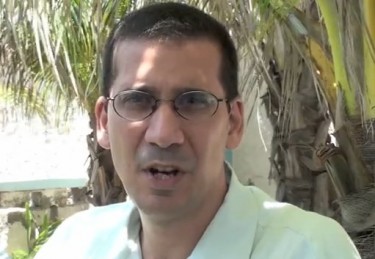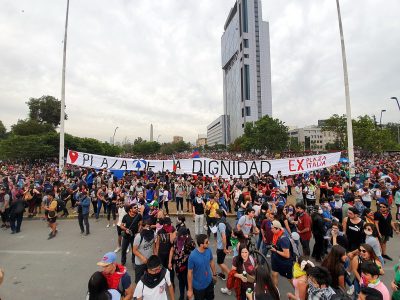This Netizen Report for Latin America and the Caribbean was researched, written, and edited by Juan Arellano, Ellery Biddle, Lully Posada, Elizabeth Rivera, Firuzeh Shokooh Valle and Silvia Viñas.
This month, detentions of netizens in Latin America and the Caribbean appear to have increased, with bloggers and activists in Ecuador, Colombia, and Cuba being punished by authorities for their online activities.
Numerous bloggers and human rights activists have been detained in Cuba, marking a growing trend on the island. In the past, although some Cuban bloggers that harshly criticize the government have experienced various forms of discrimination for their activities, detention is a measure that authorities rarely implemented. Yet in the past six months we have seen a shift towards a much tougher standard. These measures not only limit the freedom of detained bloggers, but also affect Cubans on the island that want to express themselves independently online, leaving them more inclined to practice self-censorship.
Access to knowledge
In Brazil, the much celebrated bill entitled the Marco Civil da Internet, was shelved indefinitely in the middle of November. The legislation sought to establish fundamental rights and responsibilities for Internet users in order to try to achieve a better balance between the interests of the state, Internet service providers, and users, while simultaneously safeguarding online content, privacy, and Internet neutrality. After the vote was postponed several times, the film and music industries, among others, began to pressure legislators to change the bill in accordance with their interests. Unfortunately, these efforts surpassed the Brazilian civil society mobilizations that supported the bill in its original form. The Marco Civil da Internet would have been among the most progressive bills that intended to develop a legal framework for the Internet that truly reflected the interests of the users.
Censorship
Despite maintaining the idea of having a law that criminalizes social movements, the government of Chile has slowed down the legislative process on former Interior Minister Rodrigo Hinzpeter's project [es]. The Communist Party, on its behalf, insisted that the law be withdrawn. As a result, citizen pressure against a law that restricts civil liberties in Chile has achieved a change in favor of freedom of expression.
In Peru, the so-called #sopacriolla (#homemadesoup, a reference to the SOPA piracy bill in the US) is a bill [es] that holds Internet service providers liable for content uploaded by third parties. ISP Liability [es], a blog which intended to explain the law's implications, has gone “out of service,” according to reports [es] from Chillinfart that suggest the blog may have been censored. A Facebook group called Free Internet in Peru [es] has emerged, where a strong exchange of viewpoints can be found among its members in their individual posts, an essential source for people to remain updated on the issue.
Harassment

Antonio Rodiles in Havana. Photo by Tracey Eaton, used with permission.
On November 7, various activists and bloggers were detained by state police in Havana, Cuba. Among the more well-known people of the group were Laritza Diversent, Guillermo Farinas, Antonio Rodiles and Yoani Sánchez. While most of them were released hours after their arrests, Rodiles remained detained for almost three weeks. Diversent, a lawyer and author of the blog Jurisconsulto de Cuba [es], remains in detention. Police authorities did not offer specific explanations for the motive behind these arrests, but various people in the Cuban blogosphere suggest that it was a reaction to a document entitled “The Citizens’ Demand for Another Cuba” [es], created by Rodiles and circulated throughout the past two months. Rodiles is the curator of the intellectual and independent forum Estado de SATS [es], where the public is invited to participate in debates about the socio-political future of the country.
In Colombia, blog El Salmon [es] denounced the November 20th arrest of Carlos Andrés Ospina Parra and Johan David Ruiz Rincón for the alleged crime of rebellion against the state, which, according to El Salmón, has still not been proven. Likewise, other blogs like Remap-Valle [es] report that Ospina and Ruiz are among eight people who were arrested. The group included intellectuals, students, and professors.
In Ecuador, blogger Paúl Moreno, better known by his Twitter handle @paulcoyote, was arrested on charges [es] of fraudulent access to information systems and databases. His arrest was triggered by the publication of a post in which he explains how he accessed information belonging to President Rafael Correa to demonstrate the vulnerability of online public data archive www.datoseguro.gob.ec and the website's security. During his detainment, Twitter users started a campaign with the hashtag #LiberenaPaulCoyote (#FreePaulCoyote). Moreno was released [es] on December 3.
@PateandoPiedras, a blogger [es] and journalist in Mexico, received threats for his coverage of the demonstrations during the inauguration of Enrique Peña Nieto on December 1. Pateando Piedras, who previously works for the government of Mexico City, was fired from his job for his criticisms and complaints online. Additionally, he has received threats from the city government for his coverage [es] of governmental corruption, particularly with respect to the case of Andres Lajous, a blogger and Twitter user who suffered physical attacks that seemed to have been brought on by his online criticisms.
Privacy and personal data
The Supreme Court of Costa Rica has temporarily suspended the implementation [es] of an article in the new Computer Crimes Act. The law (which we described in more detail in the previous Netizen Report) would impose a penalty of up to eight years imprisonment in cases where “secret political information” has been revealed by independent entities online. EFE reports that a federal court would examine if the law violates freedom of expression and information [es].
Sovereigns of the Internet
Ticoblogger invites Internet users to debate the proposals of Costa Rica's Computer Crimes Act reforms — Law 9048. As Renata Avila previously reported on Global Voices Advocacy, the law creates new criminal offenses that severely restrict freedom on the Internet. Ticoblogger calls to bloggers, Twitter users, and blog readers to analyze and call attention to any errors that exist in the diverse proposals to reform the law. Participants can leave a comment on the site or send their articles to info@ticoblogger.com [es].
In Colombia, the Internet Activa organization held their fifth conference on November 22 [es] within the framework of free online seminars [es] on “Digital Rights and Civil Liberties on the Internet.” The theme of the session was Internet governance and had the Internet Society's (ISOC) Regional Director for Latin America and the Carribbean, Sebastián Bellagamba, as a guest. At the end, various organizations committed to this cause were mentioned and among them were Google, ISOC, CDT and our Advocacy project.
On December 1 and 2, Developing Latin America 2012 [es] (#DAL2012), a regional hackathon [es] organized by the Fundación Ciudadano Inteligente [es] took place this year in eight Latin American countries: Argentina, Bolivia, Brazil, Chile, Costa Rica, Mexico, Peru and Uruguay. According to the website, a hackathon is “a regional initiative that unites citizens, institutions, and governments for the creation of innovative and scalable solutions to social problems common in the region. The initiative in each country is driven by open data sources, promoting their use and reuse, during a 36-hour development marathon with hundreds of developers, graphic designers, entrepreneurs, journalists and representatives from the private and public sectors.” A summary of the first and second days can be found on Global Voices.
Recent research
The Free Software Assessment Report of 2012 [es] reflects the opinion, assessment, and preferences of over 5,000 people in Spain and Latin America. The study, published in its fourth edition, is promoted by PortalProgramas and supported by various experts and collaborators [es]. As such, the report aims to contribute to the better understanding, use, and dissemination of free software in Ibero-America. The summary of the report can be found online [es] in addition to more information on the report's findings [es].




4 comments